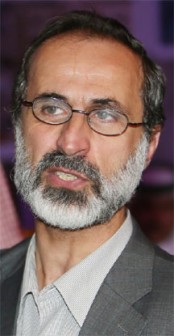ALEPPO PROVINCE, Syria/ BEIRUT, (Reuters) – Syria’s opposition leader has rejected an invitation from Russia for peace talks, dealing another blow to international hopes that diplomacy can be resurrected to end a 21-month civil war.
Russia, President Bashar al-Assad’s main international protector, said on Friday it had sent an invitation for a visit to Moaz Alkhatib, whose six-week-old National Coalition opposition group has been recognised by most Western and Arab states as the legitimate voice of the Syrian people.
But in an interview on Al Jazeera television, Alkhatib said he had already ruled out such a trip and wanted an apology from Moscow for its support for Assad.
“We have clearly said we will not go to Moscow. We could meet in an Arab country if there was a clear agenda,” he said.

“Now we also want an apology from (Russian Foreign Minister Sergei) Lavrov because all this time he said that the people will decide their destiny, without foreign intervention. Russia is intervening and meanwhile all these massacres of the Syrian people have happened, treated as if they were a picnic.”
“If we don’t represent the Syrian people, why do they invite us?” Alkhatib said. “And if we do represent the Syrian people why doesn’t Russia respond and issue a clear condemnation of the barbarity of the regime and make a clear call for Assad to step down? This is the basic condition for any negotiations.”
With the rebels advancing steadily over the second half of 2012, diplomats have been searching for months for signs that Moscow’s willingness to protect Assad is faltering.
So far Russia has stuck to its position that rebels must negotiate with Assad’s government, which has ruled since his father seized power in a coup 42 years ago.
“I think a realistic and detailed assessment of the situation inside Syria will prompt reasonable opposition members to seek ways to start a political dialogue,” Lavrov said yesterday.
That was immediately dismissed by the opposition: “The coalition is ready for political talks with anyone … but it will not negotiate with the Assad regime,” spokesman Walid al-Bunni told Reuters. “Everything can happen after the Assad regime and all its foundations have gone. After that we can sit down with all Syrians to set out the future.”
BRAHIMI TO MOSCOW
Russia says it is behind the efforts of U.N. mediator Lakhdar Brahimi, fresh from a five-day trip to Damascus where he met Assad. Brahimi, due in Moscow for talks today, is touting a months-old peace plan for a transitional government.
That U.N. plan was long seen as a dead letter, foundering from the outset over the question of whether the transitional body would include Assad or his allies. Brahimi’s predecessor, Kofi Annan, quit in frustration shortly after negotiating it.
But with rebels having seized control of large sections of the country in recent months, Russia and the United States have been working with Brahimi to resurrect the plan as the only internationally recognised diplomatic negotiating track.
Russia’s Middle East envoy, Deputy Foreign Minister Mikhail Bogdanov, who announced the invitation to Alkhatib, said Russian officials were ready to meet him in another country. He said further talks were scheduled between the “three Bs” – himself, Brahimi and U.S. Undersecretary of State William Burns.
Speaking in Damascus on Thursday, Brahimi called for a transitional government with “all the powers of the state”, a phrase interpreted by the opposition as potentially signalling tolerance of Assad remaining in some ceremonial role.
The United Nations press office in New York said Brahimi had not specifically said Assad should remain in office until the end of his presidential term in 2014.
Brahimi had said the transition “should start as soon as possible, that a government should be established as soon as possible, and that he hopes that the crisis can be solved in 2013 because it cannot wait until 2014”, it said in a statement.




